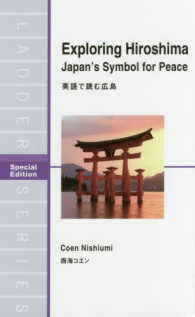- ホーム
- > 洋書
- > 英文書
- > Philosophy
Full Description
Despite recent developments in the history of emotions and in comparative studies, sustained cross-cultural comparative studies of the emotions remain few and far between. Jingyi Jenny Zhao has produced the first major work that takes two philosophers from the ancient Greek and early Chinese traditions to stimulate discussion of an interdisciplinary nature on the rich and complex topic of the emotions-in particular, of shame. It features comparative analysis of Greek and Chinese texts while bringing the ancient materials to bear on modern controversies such as the role of shame in moral education and social cohesion.
Although unalike in their social-historical and intellectual backgrounds, Aristotle and Xunzi bear striking similarities in several respects: they both conceptualize humans as essentially members of communities, as having a unique set of characteristics that set them apart from other living things, and as beings in need of moral training to fulfil their potential and become integrated into a well-ordered society. The two philosophers' discourses on shame reveal important insights into their ideals of human nature, moral education and the good life.
This book tackles directly the methodological problems that are relevant to anyone interested in cross-cultural comparisons and organizes discussions of the ancient sources to facilitate a thorough integration of perspectives from the cultural traditions concerned. This approach provides sufficient focus to allow for detailed textual analysis while giving scope for making constant connections to the broader comparative questions at issue.
Contents
CONTENTS
Acknowledgements
Introduction
1. Aristotle and Xunzi - Their Times, Texts, and Audiences
2. Mapping the Vocabulary of 'Shame'
3. Human Nature and the Social Basis for Communities
4. Shame and the Path to Moral Goodness
5. Social Institutions and the Politics of Moral Education
Epilogue








